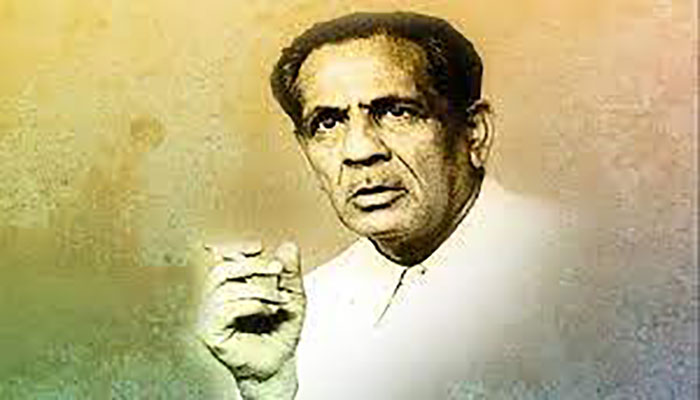‘Firaq’s enormous influence on Urdu ghazal indisputable’
No other Urdu poet of the 20th century has a corpus of ghazal to his credit that is more diverse in its style and thematic content than the ghazal of Firaq Gorakhpuri.
Canadian scholar Dr Syed Taqi Abedi said this on Sunday at the Urdu Bagh, the secretariat of the Anjuman Taraqqi-e-Urdu, where he was invited to talk on the stature of Firaq in the tradition of Urdu literature. On the occasion, the scholar also launched his compilation of the entire poetry of Firaq, titled ‘Kulliyat-e-Firaq Gorakhpuri Kamil’.
In the introductory remarks by Anjuman Secretary Zahida Hina and Treasurer Syed Abid Rizvi, Dr Abedi, who was born near Amroha in India, and is a heart specialist by profession, was praised for his literary acumen and extensive research in the field of Urdu literature.
Before the Canadian scholar launched his compilation of Firaq’s poetry, Zahida shed light on the struggle of Firaq (1896-1982), who was a Hindu whose real name was Raghupati Sahai, for the cause of Urdu in India after Partition.
The Anjuman secretary said that when the Congress tried to undermine Urdu, Firaq’s love for Urdu forced him to oppose Hindi. Dr Abedi informed the event that while the earlier compilations of Firaq’s poetic works included at most 30 of his Nazm, he was able to find and include around 80 of his Nazm in his compilation.
Similarly, he said, his compilation had between 600 and 650 ghazals penned by Firaq. However, he admitted that despite all of his hard work, he could not get all of Firaq’s poetry. For instance, he said, Firaq wrote 52 Rubaiyat on the Chinese revolution, but he could only find 20 of them.
He said Firaq’s enormous influence on the Urdu ghazal was indisputable and he is the only poet in whose works we can find specimens of the classical ghazal, specimens of ghazals that evolved under the influence of the Progressive Movement, specimens of ghazals that emerged due to the modernist movement and specimens of the post-modern ghazal.
The speaker conceded that Firaq was not an ideal man. Calling the poet a genius, he said Firaq had many abnormal traits like other geniuses. He loathed his wife, and what he wrote about her was unacceptable by all standards. Similarly, his behaviour prompted his son to commit suicide.
However, Dr Abedi maintained that the appreciation of a poetic work must be dependent only on the text and the virtues and vices of the poet must not be considered while evaluating his creative work. The speaker said Firaq’s ghazals had no precedent in Urdu literature as he amalgamated the traditions of the literature of three languages. Firaq knew Sanskrit poetry very well, and he adopted the appreciation of beauty from the Sanskrit tradition. Dr Abedi quoted some verses of Firaq describing feminine beauty in a way that many Urdu poets might consider obscene.
In the Sanskrit tradition, a woman’s beauty deserves worship, and so it should be exposed, but in the Islamic tradition, women should hide their beauty, said the speaker, adding that Firaq adopted his philosophy of beauty from the Sanskrit tradition.
Dr Abedi said that since Firaq was a teacher of English literature, he was influenced by Shelley, Wordsworth and Browning, and he tried to adopt their style of depicting scenes in his ghazals. Lastly, Firaq adopted the literary aesthetics of classical Urdu poets like Sauda, Mushafi and Jurrat, and so his poetry became the melting pot of the Sanskrit, English and Urdu aesthetics. After the speech, Dr Abedi presented the book to Anjuman President Wajid Jawad. The session was moderated by Dr Yasmeen Sultana.
-
 Andrew Mountbatten Windsor Faces Future With UK MPs, Says Expert
Andrew Mountbatten Windsor Faces Future With UK MPs, Says Expert -
 Shamed Andrew Told 'nobody Is Above The Law' Amid Harrowing Silence
Shamed Andrew Told 'nobody Is Above The Law' Amid Harrowing Silence -
 Gisele Bundchen Melts Hearts With Sweet Bike Ride Glimpse Featuring Son
Gisele Bundchen Melts Hearts With Sweet Bike Ride Glimpse Featuring Son -
 Prince William Found Meghan Markle ‘quite Refreshing’ At Start
Prince William Found Meghan Markle ‘quite Refreshing’ At Start -
 Kate Middleton Knew Should Could Not Be ‘voice Of Reason’ With Prince Harry
Kate Middleton Knew Should Could Not Be ‘voice Of Reason’ With Prince Harry -
 Rihanna Has Wardrobe Malfunction At A$AP Rocky Fashion Show
Rihanna Has Wardrobe Malfunction At A$AP Rocky Fashion Show -
 Prince Harry Felt System Had ‘one Rule For Him, One For Prince William’
Prince Harry Felt System Had ‘one Rule For Him, One For Prince William’ -
 Jake Paul's Fiancée Sends Him Over The Moon Over Stunning Victory
Jake Paul's Fiancée Sends Him Over The Moon Over Stunning Victory -
 Harper Beckham Sends Valentine’s Love Amid Brooklyn Family Drama
Harper Beckham Sends Valentine’s Love Amid Brooklyn Family Drama -
 Why Prince William, Kate Middleton 'partnership' Is Important For Monarchy
Why Prince William, Kate Middleton 'partnership' Is Important For Monarchy -
 Katie Price Drama Escalates As Family Stays In Touch With Ex JJ Slater
Katie Price Drama Escalates As Family Stays In Touch With Ex JJ Slater -
 Critics Target Palace Narrative After Andrew's Controversy Refuses To Die
Critics Target Palace Narrative After Andrew's Controversy Refuses To Die -
 Sarah Ferguson’s Delusions Take A Turn For The Worse: ‘She’s Been Deserted’
Sarah Ferguson’s Delusions Take A Turn For The Worse: ‘She’s Been Deserted’ -
 ICE Agents 'fake Car Trouble' To Arrest Minnesota Man, Family Says
ICE Agents 'fake Car Trouble' To Arrest Minnesota Man, Family Says -
 Camila Mendes Reveals How She Prepared For Her Role In 'Idiotka'
Camila Mendes Reveals How She Prepared For Her Role In 'Idiotka' -
 China Confirms Visa-free Travel For UK, Canada Nationals
China Confirms Visa-free Travel For UK, Canada Nationals




